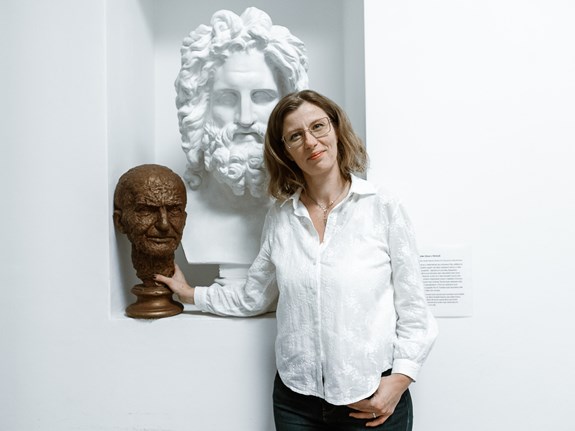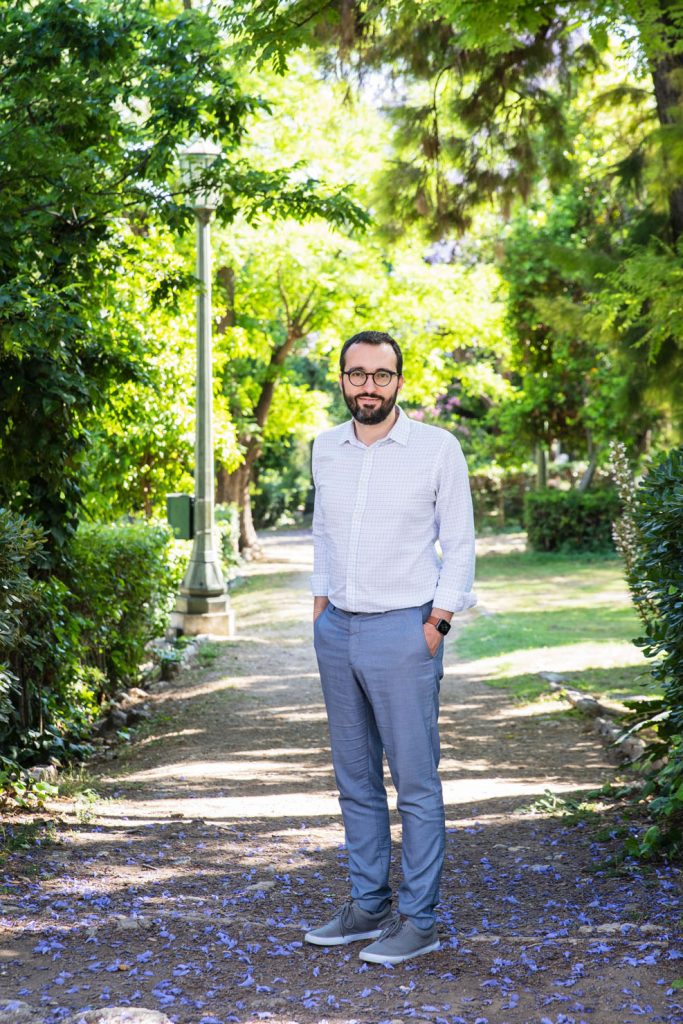The Greek language brought them together, and then their research brought them back to Greece anew. The professors from the Ohio State University, the institutional home of the Miltiadis Marinakis Endowed Professorship of Modern Greek Language and Culture, met professors from the universities of Ljubljana in Slovenia and Masaryk in the Czech Republic in Athens this summer, where, along with colleagues from the University of Athens, they participated in an academically noteworthy international seminar focused on Modern Greek for classicists.
The seminar was held at the University of Athens and succeeded in bringing together an impressive number of classical philologists for the second year running. Among them, the internationally renowned professor at the Ohio State University, Brian Joseph, an expert in the historical linguistics of Greek, who explained why he loves the language to TO VIMA.
A successful seminar in the Greek language in Athens, and at the University of Athens?
“It’s something we’d been planning for many years, but which got left behind with the pandemic. Fortunately, though, we pulled it off in 2023 and, of course, this year, too. Participants came from the Czech Republic, Slovenia and the US. Professors Jerneja Kavčič and Katerina Bokova Ludova took on the task of introducing the participants to Modern Greek in a series of intensive daily sessions. It was a decade ago that we first had the idea of developing a teaching program for Modern Greek aimed at students of classical studies. And we started with those structures of Classical Greek that are similar to those of Modern Greek.”
Could you give us some examples?
“We started with words that are the same in both the ancient and modern languages. ‘Meli’, for example, which means ‘honey’ in both, or the verb ‘pinete’, which means ‘to drink’. There’s the pronoun ‘ti’, too, meaning ‘what’, so we started the lesson with ‘What do you drink?’. We proceeded with words that are the same, but have some differences. For example, the words for ‘city’: ‘polis’ in Ancient Greek and ‘poli’ in the modern language. So we have the root which is the same in Ancient and Modern Greek, but the ending has changed, and the accusative going from “polin” to “poli”. In fact, Modern Greek has lost most of the ns at the end of words, which is a way into explaining an aspect of the evolution from Ancient to Modern Greek. So the seminar addresses the historical linguistics of Greek, the evolution of the language from Ancient to Modern Greek, and has a practical aim: allowing the program participants to understand the new forms in relation to the old.”
How did you come to fall in love with Greek?
“I teach the historical linguistics of Greek, which means I try to explain the history of the Greek language. I started Latin in high school, and when I went to university, I started to learn Ancient Greek, too. As a student, I came to Athens on a “college year” program (a half century ago!), and achieved a good grasp of Ancient Greek there and kept on studying, while I was learning Modern Greek at the same time. Then I continued with research for my Ph.D. thesis, which was on the historical evolution of the Greek language.”
Is Greek an easy language?
“All languages are both difficult and easy. One has to learn both the meaning of the words and their pronunciation. Greece feels like a second home to me, after all the time I’ve spent down the years in Athens and Thessaloniki”.
Which writers do you admire?
“I have spent a lot of time studying the medieval period, the Chronicle of the Morea and the songs of Digenes Akritas. And what really struck me about the Middle Ages was the evolution of the infinitive. My dissertation focused on what happened to the infinitive in antiquity, and I could see the continuation of that process in medieval texts. The infinitive has lost its value now, and we have replaced it with “na”, a word that performs the same function as ‘to’ in English. So Modern Greek is a language shorn of infinitives”.
Is the Greek language today simpler (or poorer) than in the past?
“No, it’s not poorer, it’s just that we use the verb and the subject of the verb now, whereas it was different before the infinitive disappeared. Take the Spartan maxim “to speak briefly is to think deeply”. That’s a four-word phrase in the Ancient Greek (containing two infinitives), while it would be at least six in Modern Greek. Of course, the roots of the language are there–they haven’t gone anywhere. The Greek language may not have served as the root of other languages, but many languages have borrowed from Greek. There are simply loans into other languages, but there are also words like “filotimos”, which do not exist in other cultures, even as a concept.”
How many students are enrolled on the Modern Greek Studies program at Ohio State?
“We have 60 students in Greek studies, and there’s Ethnography, too, which is taught by another Greek, Mr. Georgios Anagnostou. And we also have a lot of students who are interested in Cavafy and Seferis and Greek literature in general. I would also like to add that the activities of the Laboratory for the Study of the Greek Language are supported by a fund I set up–“The Brian D. Joseph Fund for Greek Dialectology”–with the help of the Greek community of Ohio.
Will your seminar be going ahead in Greece again next year?
“The five of us who taught the seminar felt that it was a great success and that the students who attended it learned a lot. It was a very important experience for them–so yes, I think so.”
What two of the academics who took part in the teaching have to say:
“A vehicle that can take you everywhere”
“This year in Athens, we applied a new teaching method for teaching Modern Greek in a program addressed primarily at students studying Ancient Greek, or Classical Literature more generally, at university. This year’s seminars differed from others we have staged in the past, in that they were based on instances of linguistic continuity between Ancient and Modern Greek and, more generally, on the findings of modern historical linguistics. As the oldest European language, with an uninterrupted written tradition spanning over 3,000 years, Greek occupies a unique position among European tongues. Sometimes I tell my students to think of it as a vehicle, a means of getting wherever they want to go.”

Katerina Bokova Ludova, Professor at Masaryk University, Czech Republic
“A unique experience”
“I’d say it was more of a summer university than a seminar. The aim was to bring classicists, who already know Ancient Greek, to Greece from all over the world, and introduce them to the modern language through an intensive one-week course. This program includes a combination of language lessons and academic lectures on more technical issues relating to language change. The experience exceeded our expectations. It was unique.”

Michail I. Marinis, Researcher, fellow of the Miltiadis Marinakis Endowed Professorship of Modern Greek Language and Culture at Ohio State University and director of the Laboratory of the same name.




